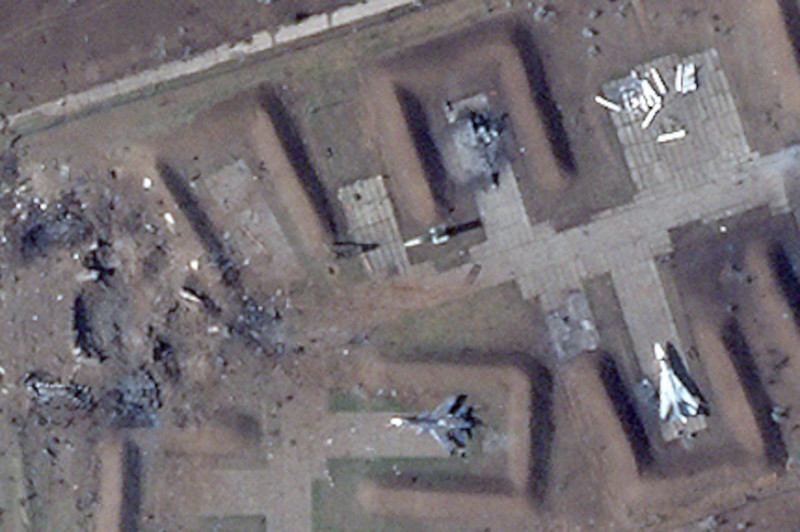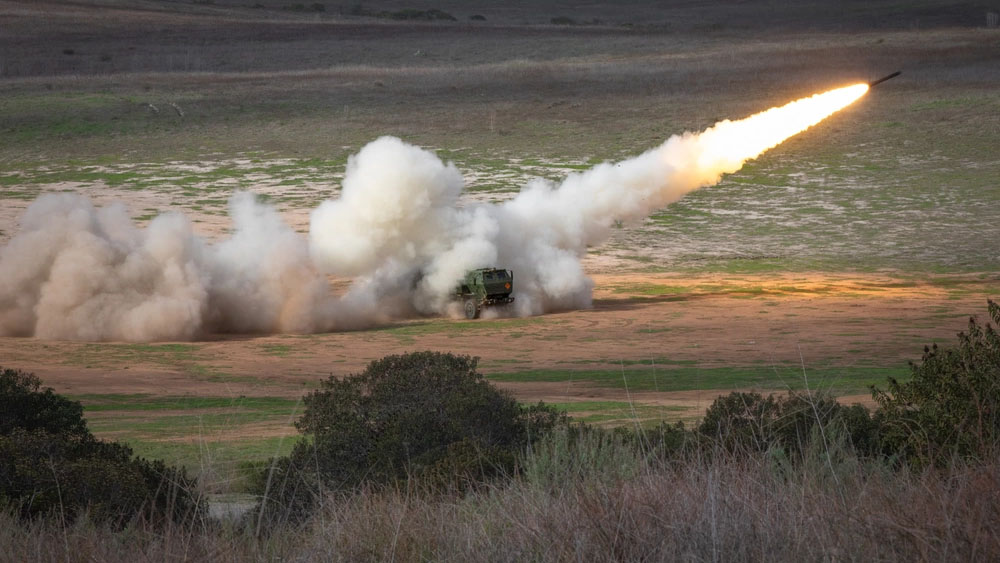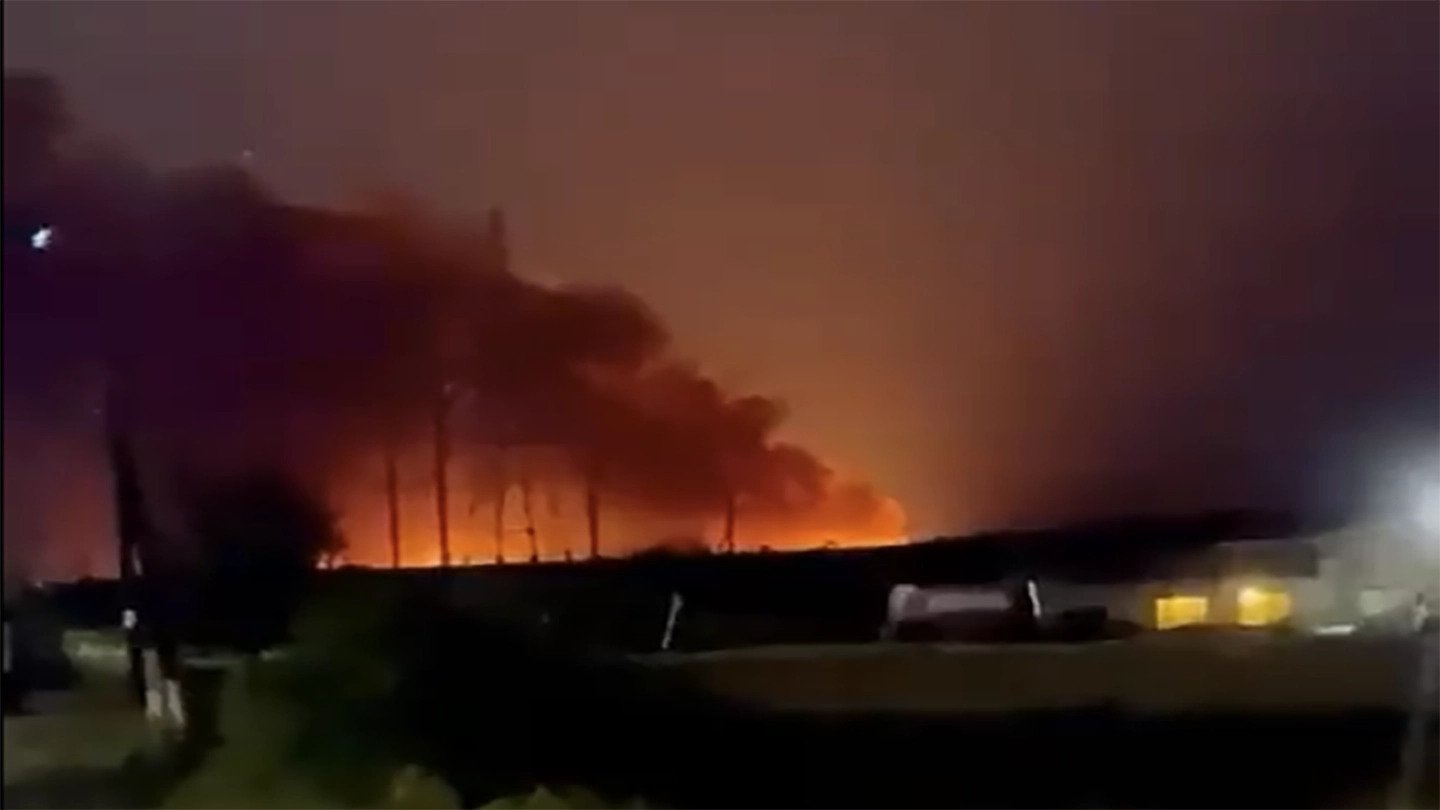As Russia continues its all-out invasion of Ukraine, it is increasingly feeling the sting of war inside its own borders and in areas it illegally annexed from its former republic in 2014.
In the latest series of events, a Russian official said an ammo dump in Belgorod Oblast caught fire Thursday and there have been reports of explosions at a Russian military base and a drone attack on the Kerch Bridge in occupied Crimea.
If all or even some of these events prove to be the work of Ukrainian forces or partisans sympathetic to their fight against Moscow, it’s another signal that the six-month-old war’s new phase is well underway.
As social media lit up with videos claiming to show a massive blaze at an ammunition depot in the Russian city of Belgorod Thursday, the governor of that oblast acknowledged that a fire did happen and that local residents were evacuated as a result.
“An ammunition depot caught fire near the village of Timonovo, Valuysky urban district,” Vyacheslav Gladkov said on his Telegram account. “According to the latest reports, there were no casualties.”
Residents of the villages of Timonovo and Soloti were evacuated, he said.
Gladkov offered no explanation for what sparked the fire, which is the latest in a string of mysterious fires and explosions to rock Russian ammo dumps within its own borders and in Crimea. Many others have also occurred in areas of Ukraine that Russia has occupied since its most recent invasion began.
“Emergency services are on the scene and the cause of the fire is under investigation.”
Beyond some coyly taunting tweets, Ukraine has not officially acknowledged any role in the Belgorod fire.
Or the latest reports of explosions in Crimea, where, about 400 miles southwest of Belgorod, unconfirmed reports emerged Thursday of explosions near a military base in Belbek and a possible drone shootdown near the Kerch Bridge, which a key advisor to Ukrainian President Volodymyr Zelensky on Wednesday suggested should be taken out.
At least four explosions hit an area near Belbek, a major Russian military air base north of Sevastopol, Reuters reported Thursday, citing three local sources, while a pro-Moscow official said there was no damage to the base.
“Air defense systems shot down…an unmanned aerial vehicle in the area of the Belbek airfield in Sevastopol, Governor Mikhail Razvozhaev said,” according to the Russian TASS news agency. “There were no casualties.”
Russian officials claim another drone was shot down near the Kerch Bridge, about 160 miles to the east.
“An unmanned aerial vehicle was shot down in the Kerch region, Vladimir Rogov, a member of the main council of the military-civilian administration of the Zaporozhye region, said on his Telegram channel,” TASS reported.
Local air defense systems destroyed the drone and “there is no danger to the city and the Crimean bridge, according to an adviser to the head of Crimea.”
Increasingly that bridge is becoming a focal point of interest by Ukraine and concern by Russia.
On Aug. 17, Zelensky advisor Mykhailo Podolyak suggested that the prized $3.5B Kerch Strait Bridge be taken out.
For Russia, concern over the bridge being attacked has been building for a while. In May, days after Russian forces were spotted preparing the bridge — which connects mainland Russia to Crimea — for missile attacks, a U.S. official told The War Zone that “Russian forces’ capabilities and logistics nodes within Ukraine are absolutely fair targets.” The War Zone followed up, asking if there were any hesitations about using U.S.-supplied weaponry against the Kerch Bridge. The official responded as follows.
“As I said, there aren’t any preclusions that I’m aware of on Ukrainians fighting on their sovereign territory against Russia.”
Exactly what is causing these incidents, as well as previous attacks on Russian installations in Crimea over the past nine days remains unclear.
Russia has confirmed media reports about explosions on Aug. 16 at the Dzhankoi munitions dump and Saki Air Base, the latter of which destroyed numerous aircraft, on Aug. 9. However, Russia blamed the former on sabotage and the latter on accidental detonation of ammunition, without saying it was attacked.

While Ukraine has officially only snarked about the incidents, its military officials have anonymously told various media outlets that the attacks were the result of “elite units.”
We covered these incidents in great detail, which you can read more about here.
Unlike Crimea, where the explosions have taken place about 150 miles from the front lines, Belgorod is only about 25 miles from the Ukraine border and within range of M142 High Mobility Artillery Rocket Systems, or HIMARS and the M270 multiple launch rocket systems (MLRS) provided to Ukraine.
Both launchers can fire a variety of 227mm rockets, including Guided Multiple Launch Rocket System (GMLRS) types made by Lockheed Martin, as well as the Army Tactical Missile System (ATACMS) short-range ballistic missiles. So far, the U.S. has only provided Ukraine with an unpublicized amount of M31 rockets with 200-pound class unitary warheads, which are GPS/INS guided and can hit targets at a distance of around 43 miles (70 kilometers.) The Biden administration has so far refused to provide longer-range and harder-hitting ATACMS. In particular, it could provide a means for Ukraine to execute precision strikes on a large variety of targets well into Russia.

But as with the attacks in Crimea, it is possible that this latest incident in Belgorod could have been carried out by elite Ukrainian units.
It wouldn’t be the first time.
Over the course of Russia’s all-out war on Ukraine, images of attacks inside Russia have appeared on social media. They’ve been carried out on a wide array of targets, including an ammunition storage facility, an airbase, and what appeared to be a daring raid by Ukrainian Mi-24 Hind attack helicopters in April that crossed low over the border into Russia and struck an oil storage facility in Belgorod.

In an exclusive interview with The War Zone in June, the head of the eponymously named Shaman Battalion, an elite Ukrainian special operations forces unit, declined to offer details about specific locations of these clandestine missions. But Shaman hinted that the April attack on Belgorod was a sign of things to come.
“You know that that explosion on the refinery in Belgorod is not the end,” he said. “It’s just the tip of the iceberg.”
Given the lack of specific, verifiable information about what’s been happening behind Russia’s front lines, speculation has run rampant about what has been used in these attacks, running from smaller, locally operated, armed drones, to special operations sabotage raids like the ones carried about by the Shaman Battalion to the possibility that Ukraine has secretly fielded its own ballistic missile system. Ukrainian forces, or those loyal to Ukraine, have used small drones in a high-profile attack in Crimea against the Black Sea Fleet headquarters before all this started, at the time we said this was just a harbinger of things to come.
Ukraine also possesses a shadowy off-the-shelf long-range precision drone attack capability that could be the culprit in Belgorod and other locales. It has been used in attacks within Russia’s own borders before. An ammunition dump would be an ideal target for it.
As Russia’s frustrations mount with the halting advance of its troops, increasing losses of personnel and equipment, ever more attacks behind his lines, and with Ukraine’s independence day just around the bend on Aug. 24, a major reprisal could be in order. At the same time, it’s very unlikely Ukraine will stop what appear to be increasingly successful attempts at bringing the war home to Russia.
Contact the author: howard@thewarzone.com
